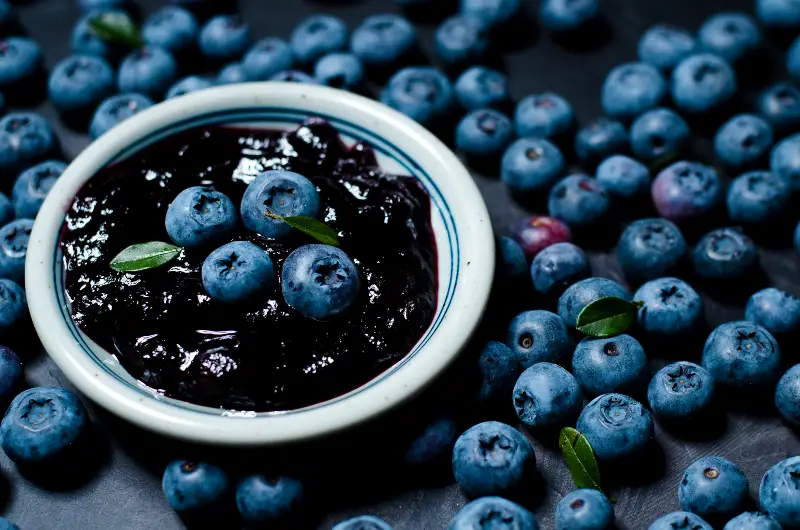Daily Consumption of blueberries are good for diabetics. Actually, the ADA states blueberries diabetic-friendly superfood. Blueberries are full of nutrients like vitamins, minerals, antioxidants, and fiber useful for supporting overall health. In addition, the fruit helps in preventing certain ailments.
For diabetic patients, blueberries might aid in weight management, glucose processing, and insulin sensitivity. Keep on reading to know about the nutritional facts of blueberries. Also, are blueberries good for diabetes?
Blueberry Nutritional Information

The fruit contains a diversity of nutrients, such as:
- Vitamins C, K, E
- Magnesium
- Potassium
- Calcium
- Folate
- Fiber
A cup of fresh blueberries comprises:
- Carbs: 22 g
- Fiber: 4g
- Fat: 0 g
- Calories: 84
Blueberries Glycemic Index and Glycemic Load
The GI value of blueberries is 53, which comes under a low GI category. This is quite similar to other fruits like mango, kiwi, pineapple, and banana. Knowing about the GI and GL of food products may aid diabetics to plan their diets.
A cup of blueberries (150 grams) contains a GL score of 10. A smaller serving (about 100 grams) will contain a GL of 6. To compare, a standard-size potato comes with a GL value of 12. This implies that one potato contains roughly two times the glycemic effect of one serving of blueberries, hence we can say that blueberry is good for diabetics.
Are Blueberries Good for Diabetics?
It is a fact that fruits such as blueberries consist of natural sugar. Moreover, they pack enough phytonutrients, vitamins, minerals, and fiber. All these nutrients are needed to support overall health. Data proposes dietary treatments are both successful and reasonable approaches to maintaining normal blood sugar levels. Also, they are important to manage weight and lower cardiac risk factors for people with high glucose levels.
While putting a restriction on extra sugars is a fine idea, the ADA does not stress avoiding fruit. ADA states that enjoying fruit is a good way to please one’s sweet tooth. It also gives added nutrition a person looks for. Providing the fruit is free of extra sugars and he or she monitors the portion size.
What do Blueberries Consist of?
Blueberries naturally consist of phytocompounds like anthocyanins. This nutrient occurs commonly in blue, red, or purple color plants and has a strong relationship with a decrease in the type 2 diabetes risk. Many diabetologists state that anthocyanins may help in decreasing the quantity of glucose formed in the liver. And, this is particularly vital for people with high blood glucose levels.
Blueberries and Insulin Sensitivity
As per a recent study, overweight adults who were prediabetic improved insulin sensitivity by having a smoothie made from blueberries. The research proposed that blueberries might increase the insulin response of the body. And, hence we can say that blueberries are good for diabetics.
Blueberries and Weight Loss
Blueberries contain fewer calories and rich amounts of nutrients. Indeed, all of them work together to support weight loss. For individuals who are obese or overweight, consuming a low-carb diet involving fruits like blueberries is just great to prevent diabetes and maintain overall health.
A study also concluded that enhancing the intake of fruits particularly berries, pears, or apples brings about a considerable weight loss. The study recommended that this data may provide guidance about obesity prevention. Obesity is the prime risk factor for medical problems like diabetes.
Blueberries and Fighting off Abdominal Fat
Furthermore, blueberries contain rich amounts of fibers. It aids to digest carbs in an improved way and sheds off abdominal fat. Too much abdominal fat secretes hormones required for supporting insulin resistance. This, in turn, makes blood sugar vanish unpredictably. Here is what a person requires to understand the relationship between diabetes and heart problems.
Blueberries and Lowering the Risk of Heart Disorders

Blueberries aid in regulating blood pressure. Also, its antioxidants maintain blood cholesterol levels. Therefore, a person can not only maintain normal blood sugar levels. However, also manage a person’s heart health using these wonder berries.
The anthocyanidins present in berry fruits help to lower arterial stiffness. This stiffness comes with aging. Hence, these compounds help the blood vessels connecting the heart to the body and make an individual age healthily. Blueberries also contain antioxidants that lower the accumulation of LDL cholesterol in arterial walls. This, adds to heart problems and stroke.
Other Blueberry Benefits
Apart from diabetes control, other health benefits of blueberries can be:
Maintains Eye Health and Vision
A blueberries-rich diet is thought to improve vision and protect against AMD or, age-related macular degeneration. Regular intake of blueberries helps to improve oxygen and blood flow to the eyes. Also, they provide the antioxidant defense with the potential to lower the probabilities of cataracts and macular degeneration.
Anti-Inflammatory and Protective
Just 1 cup provides thousands of antioxidants, vitamins A, and C, in addition to flavonoids such as quercetin and anthocyanidin. Blueberries contain natural plant compounds referred to as phytochemicals. These include anthocyanidins and ellagic acid and account for the red, and blue color of the fruit. The fruit aids in mitigating inflammation, which is the real reason for severe conditions like cancer.
Perfect Food for Gut and Urinary Tract
Studies propose that blueberries are a helpful remedy for both GIT conditions and UTIs too. Often, blueberries are suggested in a regular diet for menopausal females who experience recurrent UTIs. Blueberry work by fighting UTIs by keeping bacteria from adhering to the urinary tract lining. Also, the fruit consists of components like cranberry.
How to Consume Healthy while Managing Type 2 Diabetes?
These wonder blueberries may be a healthy inclusion in any diabetes-friendly diet. They also are beneficial foods for people aiming to manage diabetes. Other dietary sources of fiber and anthocyanins can be:
- Raspberries
- Pomegranates
- Purple potatoes
- Red cabbage
- Blackberries
- Tart cherries
Adding Blueberries to a Low Cholesterol Meal Plan
Including 1 cup of frozen or fresh blueberries is something that a majority of diabetics must realistically do. That too, at least most of the time, comes with slight to zero risk. Any blueberry fan must incorporate a few fresh blueberries into his or her morning cereal certainly. Or, they can also toss a few frozen berries into their delicious smoothies. Lyophilized blueberries constitute a pleasing snack item.
So, if you are one of those fruit-yogurt lovers, berries are a must-have. Add them to your yogurts and enjoy!!
You can also read about: How Air pollution affects the Health of Children.


9 Comments
Definitely, what a great blog and instructive posts, I definitely will bookmark your site.All the Best!
Nice post. I learn something new and challenging on blogs I stumbleupon on a daily basis.
I very delighted to find this internet site on bing, just what I was searching for as well saved to fav
Great post Thank you. I look forward to the continuation.
Definitely, what a great blog and instructive posts, I definitely will bookmark your site.All the Best!
I like the efforts you have put in this regards for all the great content.
Good article with great ideas! Thank you for this important article. watch dubai tv live
Excellent article! We will be linking to this particularly great article on our website.Windzone EE-1HD Essenti-Economy Motorcycle Tool kit – Hot Deals
Pingback: Dan Helmer